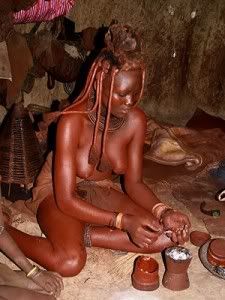grahamguitarman
 Sage
Sage
I have no personal investment in regards to what Egyptians should look like. If they were black then they were black, if they intermixed with semitic or eurasian races then so what. Its their art and culture that I love, not their racial identity. My only concern with regards to race is seeing the right people get credit for their beautiful culture.
I agree with Devor that the Idea of northern African ethnicity being different from the south is intriguing. But I'm not going to lose any sleep over it, at the end of the day its just an interesting academic conversation.
Just to throw a curve into the discussion I came across this photo earlier of a Himba girl covering herself in red ochre:

At the risk of undermining my own arguments, does that body paint look just like the red-brown seen in Egyptian paintings or what? Makes you think doesn't it, could the paintings have been depicting Egyptians using body make-up? (regardless of ethnicity BTW).
I'm not making any claims here by the way, just making an interesting observation
I agree with Devor that the Idea of northern African ethnicity being different from the south is intriguing. But I'm not going to lose any sleep over it, at the end of the day its just an interesting academic conversation.
Just to throw a curve into the discussion I came across this photo earlier of a Himba girl covering herself in red ochre:

At the risk of undermining my own arguments, does that body paint look just like the red-brown seen in Egyptian paintings or what? Makes you think doesn't it, could the paintings have been depicting Egyptians using body make-up? (regardless of ethnicity BTW).
I'm not making any claims here by the way, just making an interesting observation
Last edited:

 Maester
Maester
 Istar
Istar